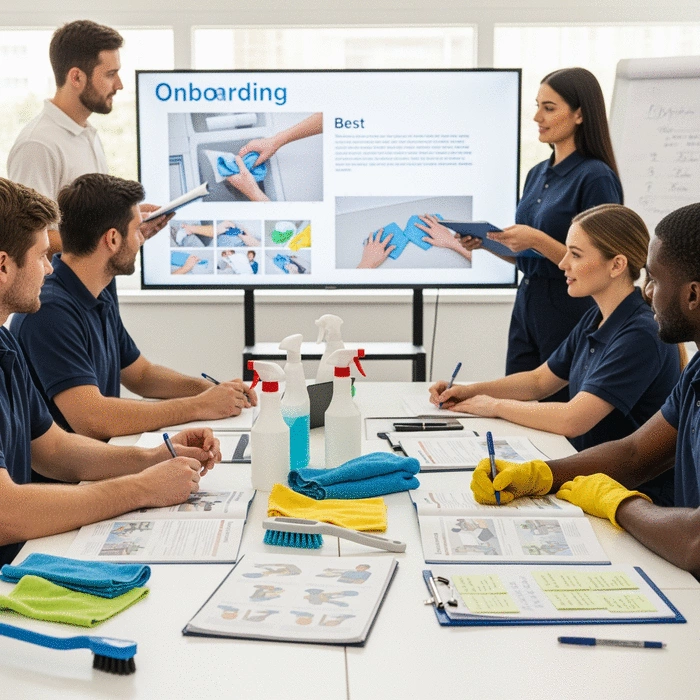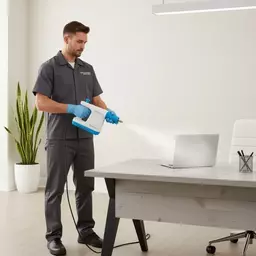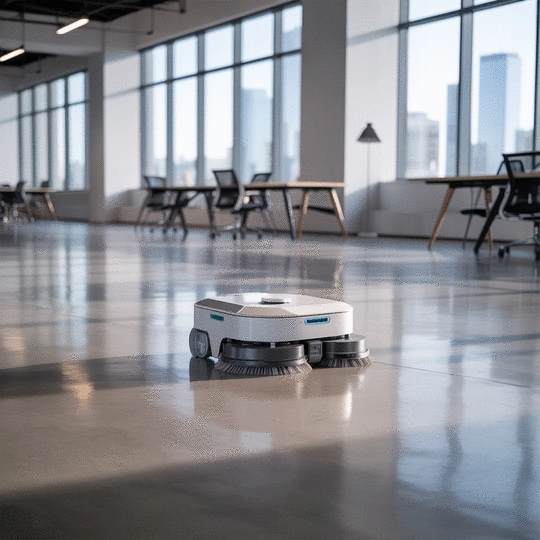Onboarding Commercial Cleaning Staff Effectively

Posted on: 2025-11-01
By: Catherine W. Devereux
Have you ever thought about how the onboarding process can influence your team's culture and performance? In the competitive world of commercial cleaning, effective onboarding is not just a formality; it's a critical strategy for success.
What You Will Learn
- Structured onboarding accelerates the learning curve for new employees, enabling them to adapt quickly.
- Effective onboarding leads to increased job satisfaction by providing clear expectations and support.
- Proper onboarding can significantly reduce turnover rates, fostering long-term loyalty among staff.
- Continuous improvement in onboarding processes is essential for adapting to varying skill levels and industry changes.
- Engaging new hires through team-building activities enhances employee engagement and retention.
- Regular evaluations and feedback from new staff can lead to enhanced training methodologies and effective onboarding experiences.
Optimizing Employee Onboarding in Commercial Cleaning
Effective employee onboarding is critical for success in the commercial cleaning industry. This visual outlines the key benefits, challenges, and best practices to ensure new staff are well-integrated and productive. For more insights into maintaining a healthy work environment, consider how sustainable cleaning products for businesses can contribute to employee well-being from day one.
Benefits of Effective Onboarding
- ✓Accelerated Learning Curve
- ✓Increased Job Satisfaction
- ✓Better Retention Rates
Key Onboarding Challenges
- ⚠Inconsistent Training Methods
- ⚠Time Constraints
- ⚠High Employee Turnover
Best Practices for Integration
- ►Clear Job Descriptions
- ►Structured Training Schedule
- ►Open Communication
- ►Continuous Feedback
Continuous Improvement & Engagement
- ‣Regular Onboarding Evaluations
- ‣Solicit Employee Feedback
- ‣Update Training Materials
- ‣Team-building Exercises
Understanding the Importance of Effective Employee Onboarding in Commercial Cleaning
As facility managers, we know that the success of our cleaning operations hinges on the effectiveness of our employee onboarding processes. A well-structured onboarding program not only sets the stage for employee satisfaction but also directly impacts the quality of service we provide to clients. In the commercial cleaning industry, where standards are high, effective onboarding is essential for long-term success.
When we invest time and resources into onboarding, we enhance our team’s ability to perform their roles confidently and with competence. This investment can lead to reduced turnover rates, improved team morale, and higher levels of client satisfaction. Have you ever considered how a thorough onboarding process can shape your team's culture and performance?

Why Onboarding Matters for Commercial Cleaning Success
Effective onboarding is crucial because it lays the foundation for new hires to understand their roles, responsibilities, and the standards expected in the commercial cleaning sector. When new staff feel welcomed and informed, they are more likely to embrace their responsibilities and contribute positively to the team. Here are some key reasons why onboarding matters:
- Accelerated Learning Curve: Structured onboarding helps new employees get up to speed quickly.
- Increased Job Satisfaction: Clear expectations and support lead to happier employees.
- Better Retention Rates: Proper onboarding reduces turnover by fostering loyalty.
By prioritizing onboarding, we set our teams up for success, equipping them with the tools and knowledge they need to thrive in the fast-paced cleaning environment.
Key Challenges in Onboarding New Cleaning Staff
While the benefits of effective onboarding are clear, we must acknowledge the challenges that can arise during this process. Among the most common hurdles are varied skill levels and the fast-paced nature of the industry. New hires may come from different backgrounds, meaning their previous experiences can vary significantly. This can create inconsistencies in performance and expectations.
- Inconsistent Training Methods: Different trainers may have different approaches, leading to confusion.
- Time Constraints: Busy schedules can limit the time available for comprehensive training.
- Employee Turnover: High turnover rates can disrupt the onboarding process.
Addressing these challenges head-on allows us to create a more effective onboarding experience that aligns with our mission at PristineForce: enhancing workplace health and efficiency through informed practices. For further insights into staff development, explore our guide on essential skills for cleaning training.
Pro Tip
To further enhance your onboarding process, consider incorporating a mentorship program. Pairing new hires with experienced team members can provide invaluable support, helping them navigate their roles more effectively. This not only accelerates their learning curve but also fosters a sense of belonging within the team.
Summarizing Best Practices for Onboarding New Cleaning Staff
As we reflect on the onboarding process for new cleaning staff, it's crucial to distill the most effective practices that yield the best outcomes. An effective onboarding program not only sets the tone for a new hire's experience but also directly impacts their performance and job satisfaction. By implementing the right strategies, we can ensure that each employee feels valued and integrated into our team from day one!
Key Takeaways from the Onboarding Process
When onboarding new cleaning staff, there are several key takeaways to keep in mind that can enhance the overall experience. First and foremost, clarity in job expectations and responsibilities is essential. This helps new employees understand what is expected of them from the outset, leading to less confusion and greater job satisfaction.
- Define clear job descriptions and responsibilities.
- Create an engaging and structured training schedule.
- Foster a culture of open communication and support.
- Provide continuous feedback to help new hires improve.
Incorporating these elements into your onboarding strategy will not only lead to a smoother transition for new staff but also contribute to long-term employee retention. When employees feel informed and supported, they are more likely to engage with their roles and contribute positively to the company culture.

Encouraging Continuous Improvement in Staff Training and Integration
Continuous improvement is vital in the fast-evolving commercial cleaning sector. By regularly evaluating our onboarding processes and seeking feedback from new hires, we can identify areas for enhancement. This practice ensures we’re not just settling for “good enough” but are instead striving for excellence in our training methodologies.
- Conduct regular evaluations of onboarding effectiveness.
- Invite suggestions and feedback from new employees.
- Regularly update training materials to reflect current best practices.
At PristineForce, we believe that a commitment to ongoing training and staff development is essential not just for compliance, but for cultivating a workforce that is skilled, motivated, and aligned with industry standards.
Strategies for Employee Engagement and Retention
Employee engagement goes hand in hand with retention. During the onboarding process, it's crucial to engage new hires by providing opportunities for team bonding and professional development. Consider implementing activities that encourage teamwork and collaboration, such as team-building workshops or group projects. These experiences help to create camaraderie among staff and can significantly enhance their connection to the organization.
- Introduce team-building exercises during onboarding.
- Offer incentives for employee referrals.
- Facilitate regular check-ins to address any concerns.
By prioritizing engagement, we reinforce a sense of belonging among new staff, which can lead to higher retention rates and a more cohesive workplace culture.
Taking Action: Implementing Your Onboarding Strategy
Now that we've summarized the best practices, it's time to take action! Implementing a robust onboarding strategy is essential for the success of your cleaning operations.
Downloading Your Comprehensive Onboarding Checklist
To assist you in this process, I've created a comprehensive onboarding checklist tailored specifically for commercial cleaning organizations. This resource will guide you through each step of the onboarding journey, ensuring you don't miss any critical aspects.
Simply visit our website at PristineForce to download your checklist and start refining your onboarding practices today!
Connecting with Other Operators for Shared Insights and Experiences
Networking with other cleaning operators can provide valuable insights into effective onboarding practices. Sharing experiences can lead to innovative ideas that enhance the training and integration of new staff. Consider joining industry groups or forums where you can exchange strategies and learn from one another’s successes and challenges.
Exploring Effective Recruitment Strategies for Your Team
As part of your onboarding strategy, don’t overlook the importance of effective recruitment practices. Identifying candidates who align with your company values and culture is essential. Utilize a structured interview process and consider incorporating practical assessments to gauge a candidate’s suitability for the role.
- Develop a clear recruitment process that aligns with your onboarding goals.
- Use role-specific assessments during the interview process.
- Communicate company culture and values throughout the recruitment process.
By focusing on these strategies, you can build a strong team that is well-prepared to face the challenges of the commercial cleaning industry, leading to a more productive and successful workplace!
Recap of Key Points
Here is a quick recap of the important points discussed in the article:
- Effective onboarding accelerates the learning curve for new employees.
- Clear job expectations and responsibilities lead to increased job satisfaction.
- Implementing structured training schedules fosters team engagement and retention.
- Regular evaluations and feedback are essential for continuous improvement in onboarding processes.
- Encouraging team-building activities during onboarding enhances workplace culture and camaraderie.
Frequently Asked Questions About Onboarding in Commercial Cleaning
Q: Why is effective onboarding crucial for commercial cleaning companies?
A: Effective onboarding is crucial because it accelerates the learning curve for new employees, increases job satisfaction, and significantly improves retention rates. It sets the foundation for new hires to understand their roles and the high standards expected in the industry, directly impacting service quality and client satisfaction.
Q: What are the main benefits of a structured onboarding program?
A: The main benefits include an accelerated learning curve, increased job satisfaction, better retention rates, and improved team morale. It also ensures new staff are well-integrated and productive from day one, contributing positively to the team and company culture.
Q: What are common challenges in onboarding new cleaning staff?
A: Common challenges include inconsistent training methods, time constraints due to busy schedules, and high employee turnover, which can disrupt the onboarding process. New hires also often have varied skill levels, requiring adaptable training approaches.
Q: How can we improve employee engagement during onboarding?
A: Employee engagement can be improved by providing clear job descriptions and responsibilities, creating a structured training schedule, fostering open communication, and offering continuous feedback. Incorporating team-building exercises and mentorship programs also helps new hires feel valued and connected.
Q: Why is continuous improvement important for staff training and integration?
A: Continuous improvement is vital because the commercial cleaning sector is fast-evolving. Regularly evaluating onboarding effectiveness, soliciting feedback from new employees, and updating training materials ensure that practices remain current, staff are skilled, and the company maintains high standards.
 What if your cleaning routine could contribute to a healthier planet? By understanding the differenc
What if your cleaning routine could contribute to a healthier planet? By understanding the differenc
 In today’s fast-paced business environment, cleanliness isn’t just a luxury; it’s a necessity.
In today’s fast-paced business environment, cleanliness isn’t just a luxury; it’s a necessity.
 Effective staff training is not just an operational requirement; it’s a strategic investment that
Effective staff training is not just an operational requirement; it’s a strategic investment that
